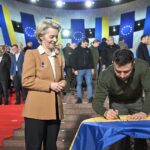An international conference

13-14 November 2025, @Palazzo Strozzi, Firenze
In recent years, the political landscape across the globe has witnessed a dramatic resurgence of authoritarian practices-even within long-standing democratic regimes. One of the most striking aspects of this transformation is the strategic deployment of collective memory: selective readings of the past, the glorification of particular historical narratives, and the silencing of others have become central tools in the reconfiguration of political legitimacy, national identity, knowledge regimes in policy-making, and other critical indigenous and cultural knowledge. These developments point to an urgent need to reconsider the political uses of memory-not as peripheral, but as central to the dynamics of contemporary governance and political contestations, which are overwhelmingly haunted by repressed memories and silenced voices of the past.
This interdisciplinary conference seeks to explore the multifaceted relationship between memory and activism in the context of democratic backsliding, authoritarian resurgence, and shifting political imaginaries. By bringing together scholars from memory studies, political science, sociology, history, cultural studies, legal studies, human rights studies, and adjacent fields, we aim to foster dialogue across disciplines and methodologies.
DAY 1, NOVEMBER 13, 2025
10.00 – 11.00
Registration and Welcoming moment
Aula Altana
Opening remarks
Donatella della Porta (Director, Centre on Social Movement Studies, Scuola Normale Superiore)
11.00 – 13.00
Plenary session 1
Aula Altana
Mnemonic acceleration in times of crisis: activism and democracy at different tempos Jenny Wüstenberg (Professor of History & Memory Studies, Nottingham Trent University)
Chair: Lorenzo Zamponi (Scuola Normale Superiore)
13.00 – 14.00
Lunch Break
14.00 – 15.30
Panel 1: Digital memory, AI, and archive activism
Aula Simone del Pollaiolo
Chair: Alessia Pensabene (Scuola Normale Superiore)
Discussant: Pietro Casari (Scuola Normale Superiore)
İpek Kaya (Kocaeli University) and Dilek Özhan Koçak (Kocaeli University): Resisting Oblivion – Digital Counter-Memory Platforms as Arenas of Democratic Struggle in Turkey
Maria Tanyag (Australian National University): “Speaking in Tongues”: Recasting the Writings of Third World Women’s Networks as Memory Work
Olga Kalashnikova ( University of Naples “L’Orientale”): Historical digital games and memory politics in post-2022 Russia: The case of Smuta
Silas Udenze (Universitat Oberta de Catalunya): Counter and Communal Memory: WhatsApp as a Mnemonic Community of Mobilisation in Nigeria’s Obidient Movement
Panel 2: Generation and memory dynamics
Aula Benedetto da Maiano
Chair: Desirè Gaudioso (Scuola Normale Superiore)
Discussant: Stefano Filippini (Scuola Normale Superiore)
Maciej Kowalewski (University of Szczecin): Intergenerational knowledge and memory transfer: the perspective of social movement archivists
Irene Martín (Universidad Autónoma de Madrid), Alejandro Ciordia (Scuola Normale Superiore), and Julián Panadero (Universidad Complutense de Madrid): A comparison between activists’ and citizens’ attitudes towards the conflicts of the past and memorial policies in Spain
Laya Hooshyari (University of Manchester): What is the significance of generational memory transmission in shaping political identities and movements in Manchester?
Wang Yuen, Ho (University of Münster): Speaking through Unfree Speech: the making of a post handover generation in Hong Kong
15.30 – 16.00
Break
16.00 – 17.30
Panel 3: Mobilizing nostalgia
Aula Simone del Pollaiolo
Chair: Jamievee Bautista (Scuola Normale Superiore)
Discussant: Nikolaos Saridakis (Scuola Normale Superiore)
Lucy Jeffery (Cardiff University) and Anna Varadi (Cardiff University): Remembering Democratic Crises in the German TV Series Deutschland 89
Dafina Nedelcheva (Stony Brook University): Europe’s Divisive Post-Communist Memory: A Threat to European Democracy
Harry Weaver (University of Warwick): Nuclear Nostalgia: Memory and the Past in the Peace Movement
Panagiotis Zestanakis (Linnaeus University ): False memory and nostalgia as a political critique: drachmostalgia on Facebook
Panel 4: Post-socialist transitions and legacies
Aula Benedetto da Maiano
Chair: Chiara Milan (Scuola Normale Superiore)
Discussant: Gianmarco Bucci (Scuola Normale Superiore)
Ana Luleva (Bulgarian Academy of Sciences): Memory, Post-socialist Transition, and the Crisis of Democracy in Bulgaria
Boris Popivanov (Sofia University “St. Kliment Ohridski”): Remembering in Protest: Sofia’s Soviet Army Monument as a Battleground for Memory and Democratic Legitimacy
Juliana Ajdini (University of Tirana): “My Grandfather Was an Enemy of the People”: Political Persecution and Inherited Memory in Albania’s Second Generation
Zemon Rubin (Institute for Advanced Studies Koszeg): Social Movements, Diversity Management and Culture of Memories in the Western Balkans”
17:30- 19:00
Panel 5: Violent memories: wars, genocides, conflicts
Aula Altana
Chair: Arees Bishara (Scuola Normale Superiore)
Discussant: Ghadir Abu Middain (Scuola Normale Superiore)
Aly El Raggal (Scuola Normale Superiore): The Specters of the Past War on Terrorism in Egypt: Collective Memory, Learning Process, and Collective Action
Eray Erkoca (Binghamton University): Genocide Memory in the Algorithmic Age: Struggles Over Remembering and Denialism in Digital Spaces
Patrick Zaki (Scuola Normale Superiore): Erasing to Remember: AI, Archival Destruction, and the War on Palestinian Memory
Yazan Abu Jbara (University of Brighton): Endurance in the Present Tense: Narrative Resistance and Durative Memory in the Palestinian Memoirs of Baroud and Karmi
Panel 6: Resisting oblivion and reclaiming memory
Aula Simone del Pollaiolo
Chair and discussant: Giuseppe Lipari (Scuola Normale Superiore)
Federica Frazzetta (Scuola Normale Superiore): What we (do not) remember? Collective memories in 40 years of opposition of military bases in Sicily.
Magdalena Rek-Woźniak (University of Łódź): Structural amnesia, political suppression or the natural course of history: the erased memory of the Polish labour movement
Ahmed Samy Lotf (Scuola Normale Superiore): The Revolutionary Learning Process Theory: A Framework explaining the role of memory in shaping movements’ Perceptions, Goal definitions, Strategies, Repertoires, and Expression of ideas
DAY 2: NOVEMBER 14, 2025
9.00 – 11.00
Plenary session 2
Aula Altana
The Radicalisation of Memory
Andrew Hoskins (Personal Chair of AI, Memory and War, University of Edinburgh) Chair: Donatella della Porta (Scuola Normale Superiore)
11.00 – 11.30
Break
11.30 – 13.00
Panel 7: Memory work as resistance
Aula Altana
Chair and discussant: Lorenzo Zamponi (Scuola Normale Superiore)
Giada Ferrucci (Western University): Remembering to Resist: The Role of Memory Work in Political Mobilization and Solidarity Movements
Giuseppe Lipari (Scuola Normale Superiore): Constructing memory through symbolic objects. The “lenzuoli” committee in Sicily in the 1990s.
Gözde Yılmaz Çıldır (Ege University): Paradoxical Resistance: When the Far Right Protests the Far Right – Memory, Amnesia, and Student Mobilization in Contemporary Turkey
Marlies Casier (Ghent University): Remembering to Resist? The Politics of Memory in European Border Zones
Panel 8: Memory in movements and movement legacies
Aula Simone del Pollaiolo
Chair: Stefano Filippini (Scuola Normale Superiore)
Discussant: Nerea Montejo López (Scuola Normale Superiore)
Anastasia Barone (Scuola Normale Superiore), Angela Adami (Scuola Normale Superiore), and Carla Mannino (Scuola Normale Superiore): Health movements and collective memory in times of multiple crises
Christina Sterniša (University of Graz): Trajectories of Female Experiences of Greek Resistance: “aloof from a penetrating gaze, the patriarchal cross”
Egesu Sayar Aydeniz (Bilkent University): Repertoire of Memory in Contemporary Youth Movements in Turkey
Iñaki Barcena Hinojal (UPV-EHU), Pedro Ibarra Güell (UPV-EHU), David Beorlegui (UPV-EHU): Memory, Democracy and the Basque Ecologista Movement
Panel 9: Memory politics and the far-right
Aula Benedetto da Maiano
Chair: Federica Frazetta (Scuola Normale Superiore)
Discussant: Davide Rocchetti (University of Bologna)
Alper Çakır (Charles University): Contested Memory and Debate among Turkish ‘Gray Wolves’: A Discourse Analysis of Social Media Pages
Camilla Zucchi (University of Pisa): Memory Politics and Democratic Crisis: The Rehabilitation of Giorgio Almirante and the Rise of Post-Fascist Legitimacy in Italy
Carlos Artur Gallo( Federal University of Pelotas), Filipe Botelho Soares Dutra Fernandes (Federal University of São Carlos): Politics of memory and right-wing governments in South America: a comparison between the governments of Mauricio Macri (Argentina, 2015–2019) and Jair Bolsonaro (Brazil, 2019–2022)
Wojciech Wozniak (University of Lodz): Interplay of the grassroots memory work and the state-run memory policy. Football fandom and right-wing government as allied mnemonic actors in Poland
13.00 – 14.00
Lunch break
14:00- 15:30
Panel 10: Colonial space legacies
Aula Benedetto da Maiano
Chair: Alena Gileva (Scuola Normale Superiore)
Discussant: Federica Stagni (Scuola Normale Superiore)
Alana Castro de Azevedo (State Archives of Belgium), and Yasmina Zian (Free University of Brussels): Symbolic Claims, Structural Resistance: The Non-Performativity of Decolonising Public Space Commissions — Case Studies from Brussels and Ostend
Mazlum Capan (Aix-Marseille University): Naming as Resistance: Toponymy, Memory, and Political Contestation in Diyarbekir
Anavil Ahluwalia (University of Stavanger): Uncomfortable Heritage in the Postcolonial City: Rethinking Colonial Legacy
Vittoria Di Grazia (IMT Scuola Alti Studi Lucca): Between State aphasia and Civic Engagement? Re signifying Italy’s Fascist and Colonial Legacies
Panel 11: Temporalities of memory
Aula Altana
Chair: Angela Adami (Scuola Normale Superiore)
Discussant: Anastasia Barone (Scuola Normale Superiore)
Angélica Vedana (NOVA University of Lisbon): Where the past becomes sacred: social movements and the contemporary legacy of the Carnation Revolution in Portugal
Lela Chakhaia (Ilia State University): Protest in Real Time: Democratic Imagination, Strategic Nonviolence, and Protest Trajectories in Georgia’s 2024–25 Mobilization
Lidia Yáñez (University of Manchester): Temporalities of Resistance: Memory, Repression, and Political Agency in the Chilean Uprising
Meghan Peters (University of Nottingham): Archiving the Future: Time, Technology, and Memory in Contemporary Global Challenges
Panel 12: Visual memory and visual politics
Aula Simone del Pollaiolo
Chair: Costanza Azzupardi (Scuola Normale Superiore)
Discussant: Jamievee Bautista (Scuola Normale Superiore)
Cem Koç (Ulster University): Memory Activism Through Stateless Cinema: An Exploration of Kurdish Documentary Film
Leah Burns (Emily Carr University of Art & Design), Marnie Temple (independent artist), Donoh Lee (independent artist): Visual Interventions: Processing Silenced and Traumatic Memory through Arts Based Practice
15:30- 16:00
Break
16:00-17:30
Panel 13: Italian post-colonial memory and anti-fascist resistance Aula Altana
Chair and discussant: Jacopo Custodi (Scuola Normale Superiore)
Gaia Ballatori (University of Milano-Bicocca): Walking Memories: Practices of the Anti-Racist Movement Against Italian Colonial Amnesia
Lorenzo Zamponi (Scuola Normale Superiore): Shades of anti-fascism in 21st century Italy: globalisation, polarisation, racialisation
Sahra Rausch (University of Naples “L’Orientale”): Decolonizing la Resistenza? Post- and Decolonial Memory Activism between Italy’s North and South
Victoria Witkowski (University of Southern Denmark): Postcolonial Memory Activism in Modern Italy
Panel 14: Memory and emotions: unifying or polarizing?
Aula Simone del Pollaiolo
Chair: Lidia Yáñez (University of Manchester)
Discussant: Franca Midori Marquardt (Scuola Normale Superiore)
Aileen Thomson (Ulster University): Memory and Emotion in Storytelling about Myanmar’s Spring Revolution
Ana Makhashvili (Freie Universität Berlin): Amnesiac Nationalism: The Far Right and the Affective Work of Forgetting on X
Keita Ando (Rikkyo University): Historical revisionism and affective polarization in Japan: The case of the Japanese Society for History Textbook Reform
17:30-18:30
Roundtable discussion
Aula Altana
Taking stock: memory and social movements nexus
Chairs: Jamievee Bautista (Scuola Normale Superiore) and Stefano Filippini (Scuola Normale Superiore)
Participants:
Donatella della Porta (Scuola Normale Superiore)
Jenny Wüstenberg (Nottingham Trent University)
Lorenzo Zamponi (Scuola Normale Superiore)
18:30-19:00
Closing moment
Aula Altana
28/10/2025

14/10/2025

Journal Article - 2025
Journal Article - 2023
Journal Article - 2023
Journal Article - 2023
Journal Article - 2023
Monograph - 2023
Monograph - 2022
Monograph - 2022
Journal Article - 2021
Journal Article - 2021